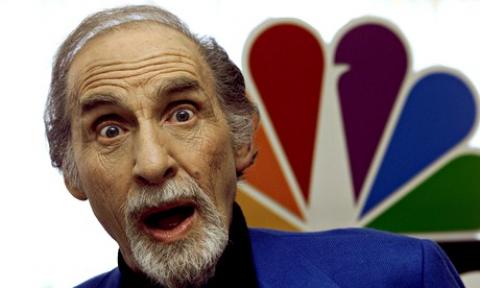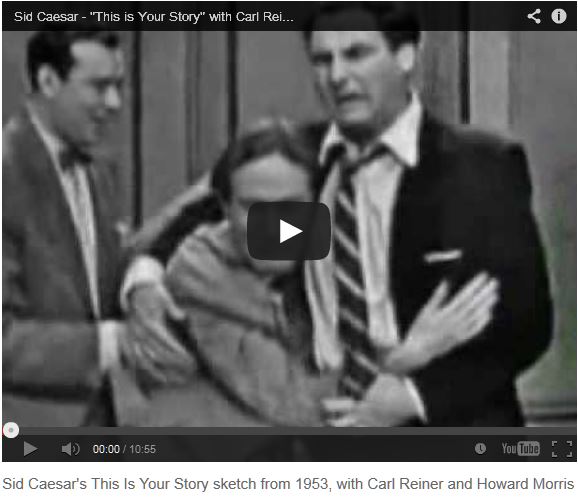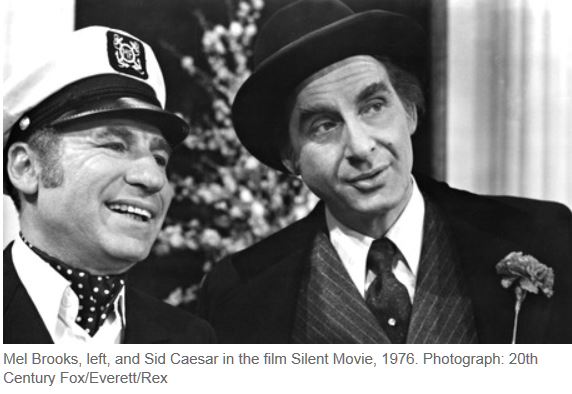Early on in their careers, Woody Allen, Carl Reiner, Larry Gelbart, Neil Simon and Mel Brooks all produced gags for the American comedian Sid Caesar, who has died aged 91. "Writing for Caesar was the highest thing you could aspire to," said Allen, adding: "at least as a TV comedy writer. The presidency was above that." Simon later based the play Laughter on the 23rd Floor on his experiences of working for Caesar's popular variety programme Your Show of Shows (1950-54), and Reiner's time with Caesar inspired him to create The Dick Van Dyke Show.
At the height of his fame in the 1950s, Caesar was making more than $1m a year and Your Show of Shows was drawing audiences of up to 25 million. Broadway theatre owners complained that as a result of his popularity, they always had empty seats on Saturday nights - the time that Your Show of Shows and its more highly regarded successor, Caesar's Hour (1954-57), were broadcast live to the nation. Caesar's fans included Albert Einstein - who died before their planned meeting - and Alfred Hitchcock, who remarked that "the young Mr Caesar best approaches the great Chaplin of the early 1920s".
It was all a far cry from Yonkers, New York, where Sid was the youngest of three surviving brothers born to a Jewish immigrant and restaurateur, Max, and his considerably younger Russian wife, Ida. "Caesar", Sid maintained, was the name given to Max by the immigration officers when he arrived at Ellis Island from Poland.
During his youth, his family ran a hotel, and Sid's passion for the saxophone meant that guests were often willing to pay more for inferior accommodation far away from the cacophony of the youngster's room. After the depression bankrupted his father, Caesar - who graduated from Yonkers high school - picked up work as a comedian, building upon the banter that he had developed with his parents' restaurant customers, talking to them in a muddle of made-up languages that became known as his signature double-talk.
As a young man, he also had success as a musician, playing with bands led by Claude Thornhill, Shep Fields and Charlie Spivak. In the early 1940s he performed in music and comedy shows at hotels in the Catskills and met Florence Levy, the niece of the entertainment director Don Appel. She engaged Caesar in long conversations about books and art, and they married in 1943.
On being called up for second world war service, Caesar became a coastguard in Brooklyn - posted initially to pier one of the Gowanus canal - in the company of the composer and songwriter Vernon Duke, with whom he began to put on shows. These included Caesar's imagined dialogue between Hitler and Donald Duck, and one of Duke's best songs, Taking a Chance on Love.
So successful were they that Duke was despatched south to put on the show Tars and Spars, the coastguards' equivalent of This Is the Army, and in due course Caesar was summoned. "One day I'm fixing toilets at the Brooklyn barracks; two days later, I'm in a room at the Palm Beach Biltmore and rehearsing all day with Victor Mature and a great choreographer like Gower Champion."
Tars and Spars inspired a 1946 film of the same name in which Caesar made his debut. He soon appeared opposite Rosalind Russell in The Guilt of Janet Ames (1947) and a long-running stage revue, Make Mine Manhattan. This led to Caesar's appearance on a television show on NBC, The Admiral Broadway Revue, which ended only when the sponsor, Admiral, which manufactured TV sets, could not keep up with the orders the commercials generated and so pulled out of the deal. Mel Brooks contributed skits to the revue, on which Caesar's regular co-star was Imogene Coca. The series soon mutated into Your Show of Shows, on which all three of them would work.
A key element of Caesar's humour lay in his pent-up mania - whether in various sorts of domestic mayhem, often at some length, or in costume sketches based on his ability to improvise cod languages and prolonged mime. He was a master of gesture, the ever-perplexed modern man.
During these years of success, Caesar could be a hard drinker. When, one night, Brooks suggested they go outside, Caesar grabbed him and dangled him out of an 18th-floor window. Caesar saw a series of analysts, whose success might be judged by the fact that - so the story goes - when his wife was thrown from a horse, Caesar went and knocked out the animal with a punch (an incident Brooks used in Blazing Saddles).
Caesar's Hour was followed by Sid Caesar Invites You (1958), but by that time viewers' tastes had changed. Caesar's show was put on hold but he was still paid - this time to do nothing, a situation that got to him so much that he stormed in and told the management what they could do with their contract. They could not believe their luck: they would not have to pay $1m a year to a comedian visibly wilting under the booze.
For a while he kept up the pace, including a run on Broadway in Neil Simon and Cy Coleman's musical Little Me (1962-63), but he sought seclusion more and more. Friends dropped away, weeks passed in a blur and he could scarcely remember the summer stock and undistinguished movies on which he ticked over. He appeared alongside a rollcall of comedians, including Reiner, Milton Berle, Mickey Rooney and Phil Silvers, in the comedy film It's a Mad Mad Mad Mad World (1963) and, having settled in Los Angeles, appeared in Brooks's Silent Movie (1976) and the musical Grease (1978), reprising his role as Coach Calhoun in Grease 2 (1982).
Fortified after a period of going cold turkey, he flew to Paris for a part in The Fiendish Plot of Dr Fu Manchu (1980) with Peter Sellers. Neither was under any illusions about its merits, but for Caesar it led to a period of revolutionary self-analysis that helped pull him through the depression he had been experiencing.
His autobiography Where Have I Been? (1983) was followed by the most affecting of his movies, Over the Brooklyn Bridge (1984). He then had the title role in The Emperor's New Clothes (1987) and - by now in his late 60s - returned to Broadway in 1989 with a show that included some of the classic sketches from his TV heyday. Those routines won him a new following when they were released on DVD.
In 2002, Caesar appeared at NBC's 75th anniversary show in New York, which was broadcast to a huge audience. "The next morning I started analyzing my performance and thinking about whether I could have gotten bigger laughs," he wrote in his second autobiography, Caesar's Hours (2003). "I stopped before the bad habits kicked in again and just enjoyed the experience. It doesn't pay to get mad at anything any more."
Florence died in 2010, and Caesar is survived by their three children, Michele, Richard and Karen.
- Isaac Sidney Caesar, comedian, born 8 September 1922; died 12 February 2014
Watch Sid Caesar here:
- Sid and Imogene at the health food restaurant
- The German General
- The Great Clock
- Argument to Beethoven's Fifth
- The Archaeology Professor
- Shadow Waltz
- Five Dollar Date*
* Sid's first appearance on network television, 1949
[Many thanks to Bill Koehnline for assembling these clips.]




Spread the word